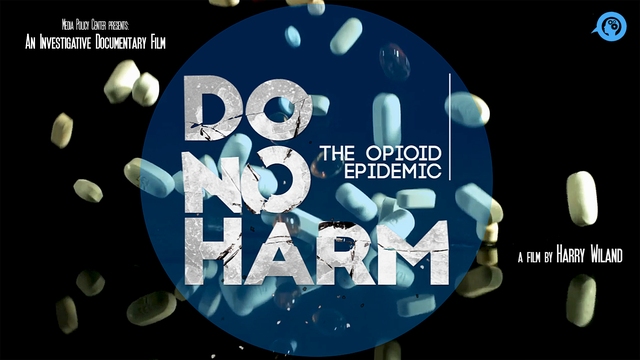Do No Harm
Investigating the opioid epidemic ravaging the United States
 A national public health emergency is sweeping through North America. In this close examination of the opioid crisis - the most deadly epidemic to devastate the US in recent years - medical professionals from all corners of the country come together to deliver their verdict. Narrated by Ed Harris, Do No Harm shows us the devastating effects of these drugs, and casts light upon those who must be held accountable.
A national public health emergency is sweeping through North America. In this close examination of the opioid crisis - the most deadly epidemic to devastate the US in recent years - medical professionals from all corners of the country come together to deliver their verdict. Narrated by Ed Harris, Do No Harm shows us the devastating effects of these drugs, and casts light upon those who must be held accountable.
Reviews and More
"The Sacklers Could Get Away With It" – Read the NY Times exposé here
“Mom, I have a love affair with heroin”. Charlotte Wethington recounts the day her son, Casey, confessed his addiction triggered by opiod pills. It was a heart-breaking conversation which came shortly before his death. Now, having tragically lost both her son and grandson, Charlotte tries to help the estimated 2 million other Americans caught in the disastrous cycle of addiction. “I am proud to be the bearer of Casey's light, so that other lights never go out.”
The prescription of pharmaceutical opioids are causing a man-made epidemic in the US. Doctors were slow to realise the addictive potential, leading to shocking levels of dependency across the country. The repercussions have been devastating, and doctors are starting to talk openly. “A few deaths, which in retrospect, clearly related to [their] prescriptions” play on their conscience, as they struggle to move forwards.
Of course, “There's a lot of blame to go around”. The FDA, medical journals and doctors do not escape scrutiny, but the pharmaceutical companies must shoulder most of the blame. Their pervasive grip on the medical industry has been cemented through aggressive marketing strategies. And with promotional materials provocatively named, such as film, ‘I Got My Life Back’, there is little uncertainty as to why these pain relieving drugs seem so attractive.
Prescribed opiods have now become a stepping stone to other drugs, including heroin. In 2016, 76% of heroin addicts in rehab started by abusing pharmaceuticals. Testimonies from those who have nearly died trying to shake this damaging addiction are heart-wrenching. No corner of US society is untouched. People are seeking help, but with detox facilities turning away 400 patients a month, they are struggling to cope.
Forging a way through the complexity of this crisis, Do No Harm presents compelling cases for the causes of this epidemic. As people across the US are dying every day from opiod-related substance abuse, this issue can no longer be ignored.
FULL SYNOPSIS
The prescription of pharmaceutical opioids are causing a man-made epidemic in the US. Doctors were slow to realise the addictive potential, leading to shocking levels of dependency across the country. The repercussions have been devastating, and doctors are starting to talk openly. “A few deaths, which in retrospect, clearly related to [their] prescriptions” play on their conscience, as they struggle to move forwards.
Of course, “There's a lot of blame to go around”. The FDA, medical journals and doctors do not escape scrutiny, but the pharmaceutical companies must shoulder most of the blame. Their pervasive grip on the medical industry has been cemented through aggressive marketing strategies. And with promotional materials provocatively named, such as film, ‘I Got My Life Back’, there is little uncertainty as to why these pain relieving drugs seem so attractive.
Prescribed opiods have now become a stepping stone to other drugs, including heroin. In 2016, 76% of heroin addicts in rehab started by abusing pharmaceuticals. Testimonies from those who have nearly died trying to shake this damaging addiction are heart-wrenching. No corner of US society is untouched. People are seeking help, but with detox facilities turning away 400 patients a month, they are struggling to cope.
Forging a way through the complexity of this crisis, Do No Harm presents compelling cases for the causes of this epidemic. As people across the US are dying every day from opiod-related substance abuse, this issue can no longer be ignored.



